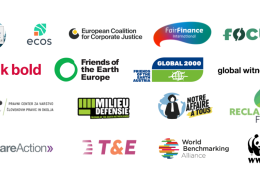The Science Based Targets initiative (SBTi) has published a draft version of its Automotive Sector Net-Zero Standard, marking a significant step towards formalising climate action within one of the world’s most emissions-intensive industries. The draft framework, released on 12 June 2025, outlines rigorous emissions reduction requirements tailored to the automotive sector and will serve as a sector-specific complement to the forthcoming Corporate Net-Zero Standard Version 2.
Automotive manufacturing—responsible for over 20% of global anthropogenic greenhouse gas emissions—is under increasing pressure from investors, regulators and supply chain risks to decarbonise. The proposed Standard sets out clear, science-based pathways for automakers and automotive parts manufacturers to align with global net-zero targets.
Structured around the latest climate science, the draft sets emissions reduction criteria across all three scopes—direct emissions (scope 1), purchased energy (scope 2), and value chain emissions (scope 3). It also introduces sector-specific guidance, building on SBTi’s Land Transport Guidance released in March 2024.
Key features of the draft include:
- Integration with the draft Corporate Net-Zero Standard Version 2, ensuring consistency for multi-sector companies;
- A new aggregated emissions indicator for automakers producing new vehicles, encompassing scopes 1, 2 and 3;
- Revised criteria encouraging a higher share of low-emission vehicle sales, replacing the need to commit to the Zero Emissions Vehicles Declaration;
- Region-specific emissions pathways to reflect differing market and economic conditions;
- Dedicated criteria for automotive parts manufacturers, emphasising emissions reductions in sourcing and production;
- Expanded methodological guidance on emissions accounting, including detailed well-to-wheel calculations.
The Standard is intended for companies manufacturing over 10,000 vehicles annually or deriving at least 20% of their revenue from automotive parts. Smaller companies may opt to use this sector-specific framework or default to the broader Corporate Net-Zero Standard.
The 60-day period for stakeholder feedback runs until 11 August 2025. Although currently in draft form, the Standard is expected to play a crucial role in shaping the future of emissions accountability in the automotive industry.
Karl Downey, Head of Sector Standards at SBTi, stated: “Decarbonising the road transport sector is a crucial component of meeting our global net-zero goals, and the automotive sector has a substantial role to play. The feedback we receive will ensure the final Standard is both ambitious and practical—empowering automakers and suppliers to reduce emissions, drive innovation, and remain competitive in a changing global market.”















